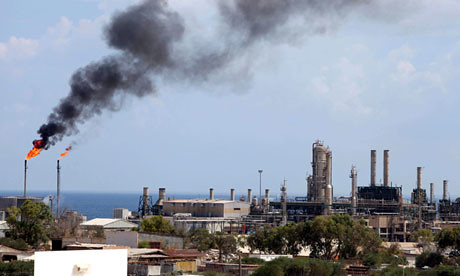
Zawiya Oil refinery in occupied Libya. Since the counter-revolution against Gaddafi and the Jamahiriya the country's oil production has declined by two-thirds., a photo by Pan-African News Wire File Photos on Flickr.
Strikes at oil export terminals in Libya puts the Prime Minister in tough position.
TRIPOLI, Libya (AP) — Libya's prime minister faced increasing calls for his ouster on Saturday as strikes by government employees at oil export terminals cost the North African country more than $5 billion in losses.
Bilqasim Shindeer el-Shibany, a board member of Libya's National Oil Corp., told
The Associated Press that oil exports almost entirely have stopped. Late last month, officials said exports were around 300,000 barrels per day, down dramatically from pre-war levels in early 2011.
Adding to the government's woes, the capital, Tripoli, has been hit with water cuts for three days and electricity outages for the past few months that last around four hours daily.
Prime Minister Ali Zidan has struggled to reign in the combustible mix of tribal feuds, disgruntled employees and renegade militias fueling the crisis. The country's nascent police and army have been unable to secure the country following the eight-month-long imperialist-led war of regime-change in 2011 that toppled revolutionary Pan-Africanist leader Moammar Gadfhafi.
The closure of onshore oil facilities have driven down production to just 130,000 barrels per day, Libya's Deputy Oil Minister Omar el-Shakmak told reporters earlier this week. An official in Libya's National Oil Corp. said Saturday that figure had risen slightly by the end of the week to 150,000 barrels per day, less than 10 percent of its pre-war levels. He spoke on condition of anonymity as he was not authorized to speak to the media.
Libya was producing 1.6 million barrels of oil per day under Gadhafi and was exporting around 1.2 million barrels daily. Production stopped briefly during the civil war, but picked up within months of Gadhafi's capture and killing at the hands of rebels, who now comprise many of the militias.
Zidan's government has been pressed to provide basic services, unify the country's tribes and restore security. Lawlessness in Libya last year led to an attack on the U.S. Consulate in the eastern city of Benghazi that killed the American ambassador and three others.
Dozens of people protested in the capital on Friday against Zidan. That same day, Libya's top cleric, Mufti al-Sadiq al-Ghiryani, called on the prime minister's government to be sacked for "incompet'ence."
The prime minister, who was not the Islamists' first choice to lead government, is also under fire from the Libyan Muslim Brotherhood's Justice and Construction Party, which called on parliament to investigate Zidan's performance, a move that could lead to a no-confidence vote against him. The party said hundreds of thousands of security personnel, many of them members of militias aligned with the government, are on government payroll, but that insecurity remains rampant.
The party also condemned Zidan's visit to neighboring Egypt this week, where he met Cairo's new military-backed leaders who took power after a coup ousted the Brotherhood's party there from power and led to a fierce crackdown against the Islamist group.
Meanwhile, gunmen in the west of Libya, whose motives are unclear, have disrupted oil supplies used mostly for the domestic market and closed down three pipelines.
Additionally, protests and strikes by oil facility guards who work for the Defense Ministry have shut down major oil export terminals in the east. Some workers are demanding higher pay and better arms for protection against criminal gangs illicitly selling oil for their own profit to rogue buyers. Others have protested for a different boss in the Defense Ministry and are federalists demanding greater rights for the east.
The volatile atmosphere threatens to further destabilize Libya and has already contributed to jitters among international oil traders and refiners.
The protests by Petroleum Facilities Guard personnel have cost Libya around $140 million a day, or what is more than $5 billion in total losses, according to the National Oil Corp.'s website.
Libya's central bank has warned that if the situation remains as it is through the end of the year, the country could lose its contracts with foreign companies. Bank officials said the national budget and the government's ability to pay civil servants would also be severely impacted.
Naji Mokhtar, head of the energy committee in Libya's elected parliament, said the strikes at ports are also choking imports of diesel and fuel oil for electricity plants, leading to rolling shortages.
"Now we don't have a choice other than using force to disperse these sit-ins," he told reporters this week.
Water shortages also have hit Tripoli in recent days, with hospitals and homes relying on storage from wells and large tanks.
The shortages began around three days ago when the Megraha tribe in Sabha cut the power on pumps that keep water flowing from the south to the northwest, where the capital is located.
The cuts are linked to the abduction of the daughter of the former intelligence chief under Gadhafi, Abduallah el-Senoussi, who hails from the Megraha tribe. El-Senoussi's daughter, Anoud, was kidnapped on Monday after she left al-Rayoumi prison in Tripoli where she was visiting her father. He is detained over his role in alleged crimes committed during the civil war.
Highlighting the government's inability to control even its own paid forces, officials said that a militia aligned with the Supreme Security Committee, which works with police and is aligned with the Interior Ministry, had taken Anoud.
A video released after her abduction shows her claiming to be under the group's protection.
"They are protecting me out of fear from other groups . and have treated me like a sister," she says.
The video could not be verified but conformed to reporting by the AP.
No comments:
Post a Comment